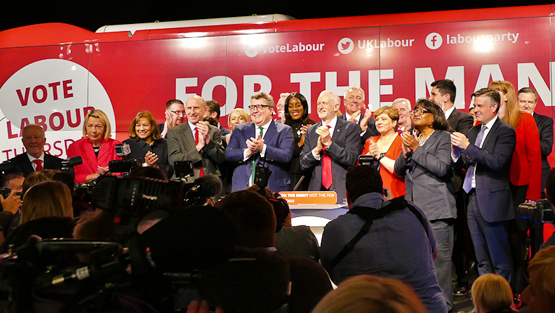To take a firm stand against institutionalized anti-Semitism, nine members of Britain’s Parliament tested the waters to leave their political comfort zone this past week by resigning as members of the Labour Party.
Perhaps this move will be exported across the pond if similar conflicts in the Democratic Party intensify. Three Democratic women joined the U.S. House of Representatives in early January after expressing hostility toward Israel. Two of the three have already tangled with pro-Israel Democrats since they were sworn in.
First seven MPs (as members of Parliament are known) announced their resignations last Monday and an eighth MP joined them on Tuesday, all to protest rampant anti-Semitism in the party and Labour’s mishandling of Brexit, Britain’s anticipated departure from the European Union. Come Wednesday, three more MPs quit the Conservative Party because of Brexit. The Jewish Chronicle of London reports all 11 MPs will now serve as part of the Independent Group in Parliament, and the prospect of forming a centrist political party has not been ruled out.
MP Ian Austin resigned from Labour late in the week without joining the Independent Group, according to the Chronicle. He said earlier that more MPs could quit Labour, the Chronicle reported.
It’s a fragile step given the historic difficulties of forming a new party or running for office without the organizational support of an established party.
This rupture signals the potential for political earthquakes not only in England but also America in a number of ways.
If advocates for the Palestinians ever succeed in controlling the Democratic Party, pro-Israel Democrats could just as well seek an alternative. Republicans are trying to help that along, but they should be wary of what moderate and liberal Democrats would do with the GOP if they switched.
Already, both parties are struggling with conflicting forces over economic issues. New York Times columnist Thomas L. Friedman suggested that factions in each party might clash as the 2020 presidential election approaches.
“Could 2020 be our first four-party election – with candidates from the Donald Trump far right, the old G.O.P. center right, the Joe Biden center left and the Alexandria Ocasio-Cortez far left all squaring off, as the deepening divides in our two big parties simply can’t be papered over any longer?,” Friedman wrote.
“Over the years our two two parties have usually managed to handle deep fractures…The level of outrage in both bases is sky high…here’s my hunch: The 2020 U.S. election will be unlike any in my lifetime,” he added.
Meanwhile, President Trump’s executive actions seem to be challenged every other day by lawsuits filed by attorneys-general in many blue states. Trump has even grappled with the governors of our most populous states over funding for important infrastructure projects.
Maybe one day governors like Gavin Newsom of California, Andrew Cuomo of New York and Phil Murphy of New Jersey will get so tired of squabbling with Trump that they will take seriously grassroots efforts in California to secede from the union. Perhaps many politicians in blue states will give this pie-in-the-sky notion real consideration.
Antagonism toward the three new congresswomen – Ocasio-Cortez, Ilhan Omar and Rashida Tlaib – compounds the possibility of varied breaches in both parties that can transform the political landscape.
House Speaker Nancy Pelosi is fielding demands to remove Omar from the Foreign Affairs Committee where Omar, of Minneapolis, could influence Middle East legislation. A petition protesting Omar’s appointment to the committee, devised by young conservative Jacob Wohl, drew more than 188,000 signatures as of Thursday.
The petition appeared to contain mostly non-Jewish signatures. Jewish-sounding names comprised a small minority of the signatures I spotted. Certainly, one can never identify a person’s religion or ethnicity for certainty by their name, but the sounds of names are a healthy indicator. The petition suggests that the Jewish community has many friends in America, maybe far more so than enemies – even if it does not seem that way now.
Ocasio-Cortez, Omar and Tlaib – and other colleagues with similar views – may be incapable of harming relations between Israel and America during the next two years. The real worry comes if their numbers multiply, forcing the Democratic Party to become America’s version of what is now Labour.
Their critics need to focus on 2020 and other future congressional elections to try to oust those three and prevent other anti-Israel candidates from getting elected to Congress. Already, Democrats formed an organization, the Democratic Majority for Israel, specifically for that purpose.
DMI has its work cut out for itself. A half-dozen Democratic members of Congress in and around New York City could face primary challenges from candidates who, like Ocasio-Cortez, are considered “progressives,” according to The Times. Whether “progressive” equates with bashing Israel is not mentioned, but if recent history is a guide then Israel supporters have much to worry about.
“Imagine what we can do with more primary wins across the country,” says Alexandra Rojas, executive director of Justice Democrats, which recruits progressive primary challengers, as quoted in the Times.
We can imagine. That’s what scares us.
Republished from San Diego Jewish World.


























